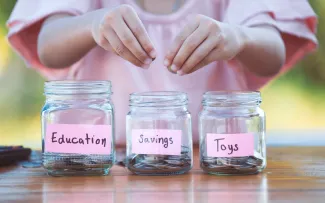
Four Simple Ways to Start Teaching Your Kids About Money
It’s that time of year again – time for kids to go back to school. Your school shopping is complete. You’ve labeled supplies and packed backpacks. You’ve mentally plotted your morning routine, leaving plenty of time to spare (although, it will likely still be hectic). We do so much to help our kids prepare for success at school. This got me thinking, are we doing enough to help them prepare for success in other areas, especially financial success? I don’t mean that it’s a parent’s job to make sure their kids grow up wealthy. What I mean is that we need to make a concerted effort to instill the basics of financial literacy in our children at a young age, so that they can make sound decisions with whatever assets they may have someday. This may seem like a daunting task, but there are several simple ways to start.
1. Teach your kids to be financially responsible.
Schools have gotten a lot better than they used to be about including financial literacy in their curriculum. Some states even require personal finance courses for students to graduate. But nothing is more powerful than the lessons taught at home. A great way for parents to teach their children about financial responsibility is by showing them how money is used. One of the ways to help kids understand is to take them grocery shopping. Talk to them about the costs of goods and show them how you can get different types of the same item for different prices.
Another way to teach kids to be financially responsible, especially for older kids, is to have them help pay for big purchases. If your kid wants a new bike or a phone, decide on an appropriate percentage for them to contribute to the cost. This will help them realize the importance of spending wisely and the sacrifices it often takes to save for a goal.
2. Help your kids open savings accounts and investment accounts.
If you go to your bank, you will find there are accounts that are solely for minors and their parents. Sometimes these are called Teen Accounts, and have little to no fees associated with them. These accounts give children a place to practice the responsibility and independence needed for managing their own funds.
The types of investment accounts available to parents and their children include UTMA, UGMA, and custodial IRA accounts. These accounts offer a great opportunity to not only teach your child about saving, but also the power of investing over a long period of time (see idea number 4).
3. Involve your kids in the family finances.
One simple way to help your kids learn about money is to engage them in open and honest conversations about money. Rather than saving any budgeting conversations for after the kids are tucked in bed, have regular talks about money in their presence. How does your family earn money? What do you spend money on? What are you saving money for? Allow your kids to ask questions and answer them in simple, plain language. It’s more important to help them understand the concepts being discussed than your family’s actual numbers.
4. Teach your kids the power of compounding interest.
My kids respond well to learning by hearing a story. On the way to Grandma’s retirement party, consider telling your kids the story of how Grandma opened a retirement account when she first started working. Tell them how by investing her savings early, it allowed them to grow over time, so that now she can choose to stop working and be a snowbird in Florida. It might not feel like a very natural conversation, but it’s the kind of thing that sticks with kids, without them even realizing it.
Another way to teach older children is to give them a real-life option for their savings – a traditional savings account or an investment account. Not only does this allow you to teach the valuable life lesson of the power of compound interest, but your child will also get to experience a real-life math application (which could come in handy next time they complain about their algebra homework).
It’s easy to find reasons not to talk to your kids about money – you were taught that it’s bad manners, you don’t want your kids to worry about (or fixate on) it, or you believe it will go over their heads. But at Affiance, we believe that starting the conversation early and repeating it often tends to lead to the best results. Start with a small lesson and work your way up. Your kids will thank you – and you’ll be glad you did.

